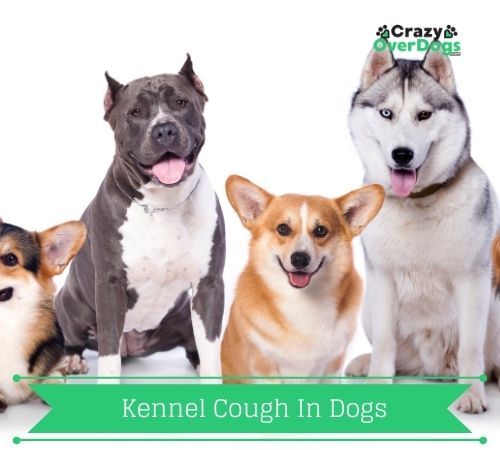Dogs and kennel cough. Is It dangerous? It is a chronic upper respiratory infection, which is sometimes referred to as a canine viral respiratory disease. This health issue occurs when the mucus secreted by the nose and throat of a dog, is contaminated with a virus.
The content takes around 6 minutes to read, but if you are in a hurry, we have also included a table of contents below so you can see at a glance what the content is.
Make sure to check out today’s deals to SAVE money on dog products by clicking on the graphic below. Don’t miss out.
This post contains affiliate links and I will be compensated if you make a purchase after clicking on my links.
This debilitating condition has been affecting canines all over the world for as long as we’ve been keeping records. In fact, the exact origins of kennel cough in dogs are uncertain. Some believe it was first recorded back in the 1800s. Others think it can be traced back much further, to ancient times.
One of the most common culprits for a dog developing this health issue is exposure to the bacteria Bordetella.
Table Of Contents
Other Contributing Factors:
- Cold temperatures.
- Badly ventilated or crowded conditions are found in many kennels.
- Exposure to dust.
It generally affects older dogs and puppies. Since it is highly contagious, it is important to make sure your dog receives treatment immediately if they are showing symptoms of kennel cough. If left untreated, it could eventually result in death.
Symptoms Of Kennel Cough In Dogs:

Kennel cough is a viral respiratory infection that causes the tracheal and bronchial cavities to become inflamed, causing a hard, dry cough.
This cough may sound like your dog has something stuck in there. However, this isn’t the case. The cough is caused by a variety of pathogens, including canine adenoviruses, streptococcus, and several other pathogens.
The symptoms include lethargy, lack of appetite, vomiting, coughing, and more. If your dog experiences any or all of these symptoms, you should take them to the vet right away for a proper diagnosis.
The most common symptom is a hacking cough that produces a brassy odor from the back of the throat. You will also notice that the dog will shake a little bit, as well as cough up a few blood drops.
The dog’s chest may also feel quite cold. It is quite possible for the dog to lose some of its ability to breathe. If this occurs, you will need to get the dog to the veterinarian as quickly as possible.
The most serious cases are often fatal. Pneumonia is due to the inflammation of one of the dog’s lung cores. This is accompanied by fever, loss of appetite, lethargy, excessive salivation, and swollen lymph glands. If you notice these symptoms in your dog, it is best to have him checked out by a vet as soon as possible.
Treatments For Kennel Cough in Dogs:

Treatment of kennel cough can last from ten to fourteen days, although it could easily be outlived. When and if it is diagnosed, treatment is usually administered through the pet’s natural immune system.
An effective treatment plan consists of a series of medications. In most cases, these medications are given through a nasal spray, an oral syringe, or a direct injection into the affected area.
The medications used for kennel cough treatment are very similar to those used for pet colds, which is why most treatment sites advise that the same medications that are used for pets should also be used for dogs.
One way that most vets recommend is to give them an effective cough suppressant. Since this is an infectious disease, it is critical that you work alongside your veterinarian to make sure that your dog’s cough is not getting worse.
The best way to do this is by administering the appropriate dosage to the dog on the spot. If you do not give the right dose or if the medicine gets mixed with water, the chances are that your dog will not get cured, as is common with many types of pneumonia.
Severe Cases Of Kennel Cough:

In some severe cases, your vet may prescribe oral antibiotics in order to help your dog fight off the illness.
However, the antibiotic would also reduce the likelihood of your dog developing the potentially life-threatening complications brought about by pneumonia.
When given at the right dosage and with the proper dose adjustments, antibiotics can help relieve the symptoms brought about by this health issue.
They are more efficient in cases where the symptoms are more severe. However, you should never underestimate the seriousness of this sickness and you should always take extra precautions when giving your dogs antibiotics.
You should always be reminded to administer the appropriate dosage of cough medicine to your dog. If the cough medicine does not work, you should consult your veterinarian for further treatment options. We hope that this article about dogs and kennel cough has helped you.
————————————-
Make sure to check out today’s deals to SAVE money on dog products by clicking on the graphic below. Don’t miss out.
This post contains affiliate links and I will be compensated if you make a purchase after clicking on my links.
Estimated reading time: 6 minutes
———————————
Disclaimer: All material on this website is provided for your information only. It may not be construed as medical advice. No action or inaction should be taken based solely on the contents of this information. Instead, readers should consult appropriate health professionals or veterinarians on any matter relating to their pet’s health and well-being. The publisher is not responsible for errors or omissions.


